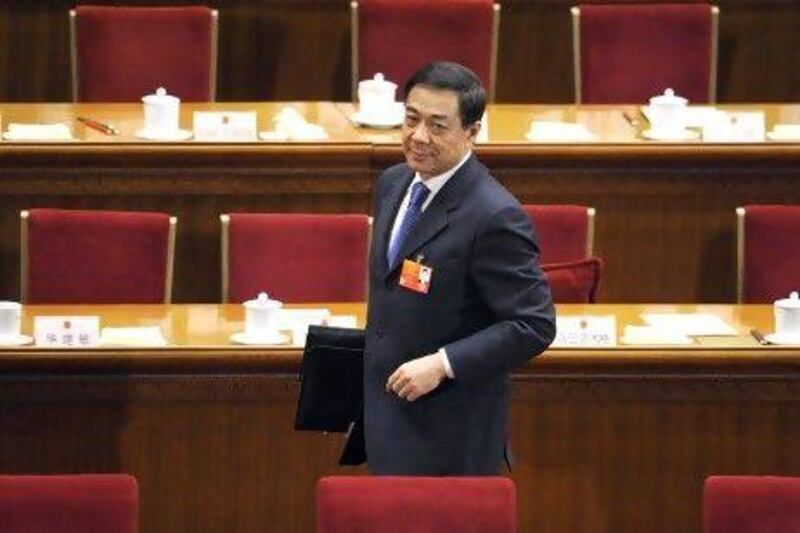BEIJING // The downfall of Bo Xilai, the provincial Communist Party chief once seen as a future leader of China, took another sensational turn this week with his suspension from the politburo and the announcement that his wife is the leading suspect in the mysterious death of a 41-year-old British businessman.
Mr Bo's dismissal from the 25-member body that rules China and the arrest of his wife over what authorities have now reclassified as the "intentional homicide" of Neil Heywood in a Chongquing hotel room is the biggest political scandal to hit China's Communist Party in a generation.
The latest charges against Mr Bo's family appear closely linked to factional fighting in the party's upper echelons as China undergoes its once-in-a-decade transition of power.
"The whole case is related to the power struggles among the top leadership," said Li Mingjiang, a China political analyst at Singapore's Rajaratnam School of International Studies.
The death in 1976 of Mao Zedong and the 1989 Tiananmen Square protests also resulted in upheaval as factions vied for influence.
After Mao's death there were struggles between old-style Maoists and reformers like Deng Xiaoping, who eventually prevailed.
In 1989, hardliners blamed the Tiananmen Square uprising on reforms of the liberal party chief, Zhao Ziyang. The army moved into Tiananmen Square and Mr Zhao spent the rest of his life largely under house arrest.
More recently, power struggles have appeared more muted, but they still occasionally burst into the open. In particular, in 2006 the Shanghai party secretary, Chen Liangyu, was dismissed and later jailed for 18 years for corruption. That was seen as Hu Jintao, the president, scoring a blow against the "Shanghai gang" of officials loyal to his predecessor, Jiang Zemin.
Now, battle lines are drawn between liberal elements such as the premier, Wen Jiabao, keen for economic and political reforms, and hardliners such as Mr Bo, a charismatic 62-year-old who favoured greater state control in the economy.
With Mr Wen and six of his colleagues set to retire from the nine-strong politburo standing committee later this year, jockeying between the factions has intensified.
The chain of events that has engulfed Mr Bo, once a favourite to enter the standing committee, appears to have been a convenient pretext for opponents to push him aside. Yet the infighting now is not of the same magnitude as that of previous decades, said Mr Li.
"Ideological differences are there, but they're not as severe as in the late 1980s," he said. "Also, the context is a bit different. There's no real strongman in the political system. There's no final arbiter on the power struggles, so a lot of the power rivalry will ultimately be resolved by give and take."
China's state-run Xinhua news agency said on Tuesday that Mr Bo, who had attracted attention in Chongqing for an uncompromising crackdown on organised crime and an initiative to promote Communist Party nostalgia, had been suspended from the 25-strong politburo and the larger central committee.
Mr Bo was reportedly at the Communist Party's retreat at the seaside town Beidaihe.
It also announced his wife, Gu Kailai, and a family employee, Zhang Xiaojun, were under arrest and "highly suspected" of killing Heywood, whose death in November was initially said by police to be the result of alcohol poisoning.
In February Mr Bo's former Chongqing police chief, Wang Lijun, fled to the US consulate in nearby Chengdu after Mr Bo was reportedly angered by an investigation into Ms Gu's possible involvement in Heywood's death.
Heywood, found dead in November, had close links to the Bo family and went to the same elite British private school, Harrow, as Mr Bo and Ms Gu's son, Bo Guagua. More recently however the Briton is said by Xinhua to have become embroiled in a financial dispute with the family.
Given that state media have named Ms Gu as a suspect, she will almost certainly be convicted, as the judiciary is subservient to party authority.
Execution is a remote possibility, said Mr Li, as Ms Gu is unlikely to have carried out any killing herself. The family employee is more likely to become the "scapegoat".
What fate will befall Mr Bo for unspecified actions Xinhua said "seriously violated party discipline [and] brought loss to the party and the country" remains unclear. A quiet retirement is the best he can hope for; jail is another outcome.






